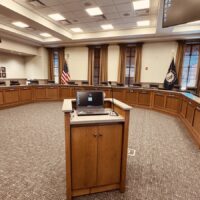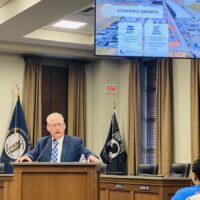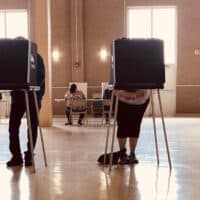The Nonpartisan Elections Citizens Committee has its next meeting at 5:30 p.m. Thursday, when the members are slated to begin preparing a report to Mayor Wendell Lynch and Hopkinsville City Council.
The meeting, at the Memorial Building, will be the panel’s first session since gathering input from a panel of experts on Dec. 14 and from local citizens on Jan. 13.
- WATCH: Experts provide input on nonpartisan elections
- WATCH: Residents share feedback on potential shift inn Hopkinsville elections
The committee’s charge is to prepare a report that outlines its finding on the potential impact of Hopkinsville switching from partisan to nonpartisan elections for city council and mayoral races.
Lynch established the committee by executive order last April.
In July 2020, he vetoed a 6-5 city council vote to switch to nonpartisan elections — and the council did not have the eight votes needed to override the veto. Historically, it is extremely rare for a Hopkinsville mayor to veto a council vote, but Lynch said he believed residents needed more time to learn about the possible impact of nonpartisan elections.
Under the current system, candidates for Hopkinsville’s 12 ward seats run with party affiliation in the primary, and voters can only cast ballots within their party and ward. In the general election, voters are not restricted to candidates in their party and can cast ballots in each of the 12 wards.
The committee began meeting in June. Although the mayor did not give the panel a deadline to complete its work, committee chairman Rich Maddux said last month that he anticipated the group would work on the report at its monthly meetings in February and March.
The executive order outlines the following tasks for the committee:
- Learn and educate the general public in an unbiased manner on the subject of partisan elections vs. nonpartisan elections.
- Explore the basis for changing the present system.
- Clearly articulate the advantages and disadvantages of both systems.
- Explore the potential impact on voter participation, if any.
- Determine whether or not this framework is under consideration or appropriate in other elections (i.e. local, state or federal elections, including county government, governor. senate, congress, presidency) and explain why or why not.
- Study other municipalities that have transitioned to nonpartisan and review the before and after impacts.
- Compare similar municipalities of our size and diversity.
- Determine whether or not the proposed change to nonpartisan would disproportionately impact representation of any particular segment of the community (i.e. gender, ethnicity).
- Determine whether or not the proposed change to nonpartisan would improve voter participation.
- Host public meetings/forums as appropriate for feedback and education on the issue.
- Travel to other communities and/or invite guests from other communities to Hopkinsville to share data and experiences.
- Review the change in the light of any long-term disparate impact that may result on any group.
- Engage all available resources in the accomplishment of your charge.
- At the conclusion of the process, present a detailed report to mayor and Hopkinsville City Council.
Jennifer P. Brown is co-founder, publisher and editor of Hoptown Chronicle. You can reach her at editor@hoptownchronicle.org. Brown was a reporter and editor at the Kentucky New Era, where she worked for 30 years. She is a co-chair of the national advisory board to the Institute for Rural Journalism and Community Issues, governing board past president for the Kentucky Historical Society, and co-founder of the Kentucky Open Government Coalition. She serves on the Hopkinsville History Foundation's board.





